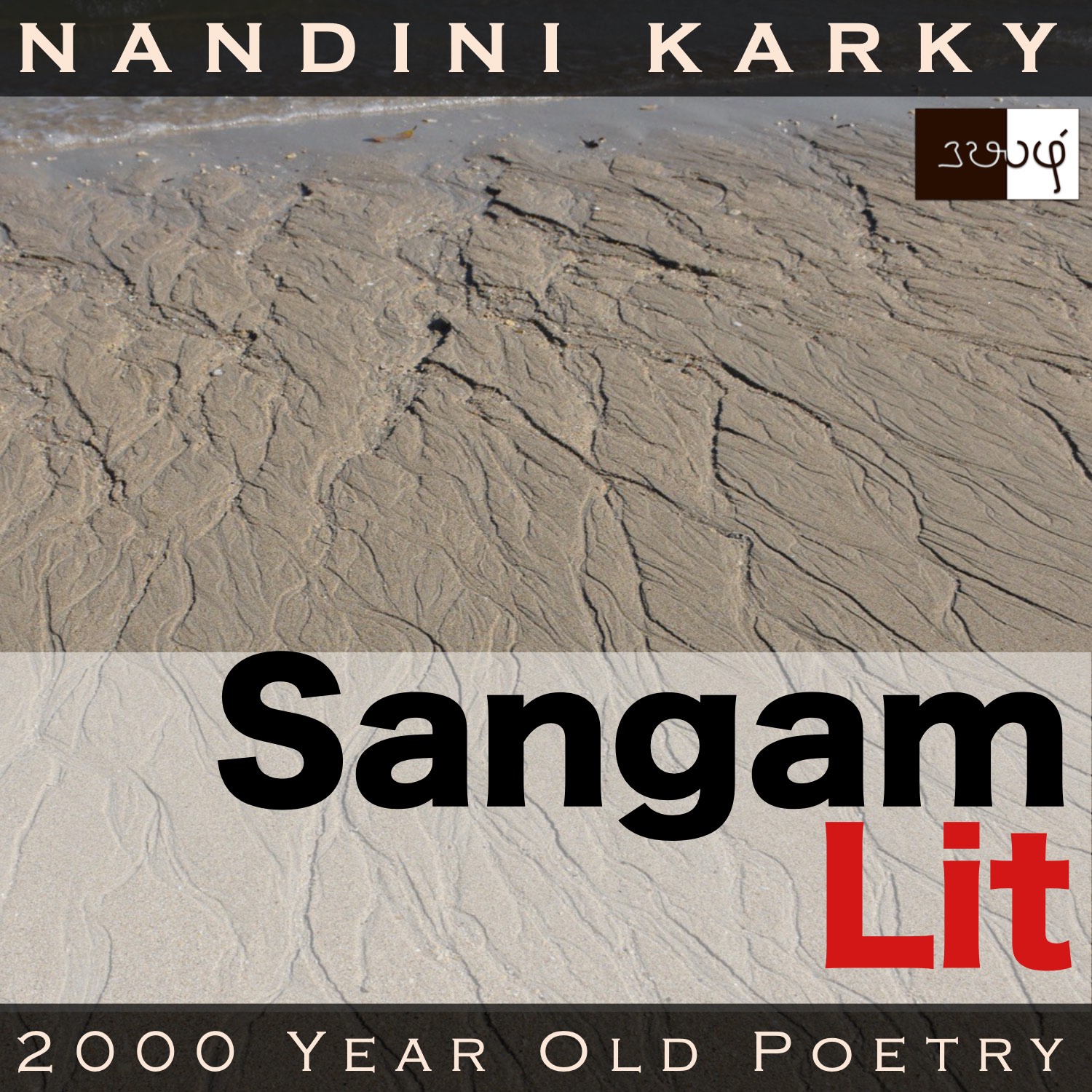Podcast: Play in new window | Download
Subscribe: Apple Podcasts | Spotify | Amazon Music | Android | iHeartRadio | TuneIn | RSS | More

In this episode, we travel to a salty shore and listen to a sweet conversation, as portrayed in Sangam Literary work, Natrinai 254, penned by Ulochanaar. Set in the coastal regions of ‘Neythal’, the verse speaks in the voice of the confidante to the man, conveying excessive words of reassurance as the man prepares to part away, dejected at the lack of response.
வண்டல் தைஇயும், வரு திரை உதைத்தும்,
குன்று ஓங்கு வெண் மணற் கொடி அடும்பு கொய்தும்,
துனி இல் நல்மொழி இனிய கூறியும்,
சொல் எதிர் பெறாஅய் உயங்கி, மெல்லச்
செலீஇய செல்லும் ஒலி இரும் பரப்ப!
உமணர் தந்த உப்பு நொடை நெல்லின்
அயினி மா இன்று அருந்த, நீலக்
கணம் நாறு பெருந் தொடை புரளும் மார்பின்
துணை இலை தமியை சேக்குவை அல்லை-
நேர் கண் சிறு தடி நீரின் மாற்றி,
வானம் வேண்டா உழவின் எம்
கானல்அம் சிறு குடிச் சேந்தனை செலினே
Opening with ‘வண்டல் தைஇயும்’, which means ‘building sand houses’, the verse makes us sense the beach sand in our hand, as we recollect this favourite pursuit. The phrase ‘கொடி அடும்பு கொய்தும்’ meaning ‘gathering flowers of the beach morning glory’ brings forth a plant that seems to have been prevalent on the shores of ancient Tamil land. ‘துனி இல் நல்மொழி’ which means ‘fine words sans resentment’ highlights right communication. As we glance at ‘உப்பு நொடை நெல்லின்’ meaning ‘paddy exchanged for salt’, we understand the economic activity of barter, where salt was exchanged for paddy two thousand years ago. The long phrase ‘நேர் கண் சிறு தடி நீரின் மாற்றி’ paints for us the salt fields of yore for it means ‘straight and square salt fields flooded with sea water’. ‘வானம் வேண்டா உழவின்’ meaning ‘agriculture that looks not to the skies’ talks about the cultivation of salt and how, unlike the paddy grown in the agricultural regions of ‘Marutham’ and millets grown in the mountainous regions of ‘Kurinji’, the salt grown in these fields, is not dependant on rain water. The verse ends on a warm note of invitation in ‘சேந்தனை செலினே’ meaning ‘why don’t you stay and then leave?’ Let us accept the welcome too and stay a little longer in this song from the sea!
The man had met the lady in the shores and fallen in love with her. The lady too reciprocates this feeling. However, as custom dictated then, it was required of the man to win the support of the lady’s best friend, her confidante. The man takes up efforts to please the confidante but the confidante does not relent easily. After one such day, as the man prepares to part away, the confidante turns to him and says, “Building sand houses, kicking waves, plucking flowers of the ‘adumbu’ vine that spreads on mountain-like, white sand dunes, speaking kind and good words without even a bit of displeasure, you have been with us. Now, not receiving a response for your words, with distress, you are preparing to gently part away to your hamlet, O lord of the resounding shores! As your horses feed on cooked rice made from paddy obtained in exchange for salt bartered by salt merchants, you, who wears a huge garland of blue flowers across your chest, shan’t sleep alone without company, if you stay in our little hamlet by the shore, where there’s cultivation that’s not dependant on the skies, in those straight and small salt fields, flooded with seawater!” With these words, the confidante is passing on a subtle message to the man to come seek the lady’s hand in marriage.
Now, for the nuances! The confidante starts by talking about all the activities the man has been doing with them since morning and this includes building sand houses, splashing in the sea water, and plucking beach morning glory’s purple flowers. This makes me wonder if the lady and man were indeed that young when they take to courting each other or have our young adult pursuits changed so drastically that this seems like the play of children? As we look at this verse with our twenty-first century eyes, these activities do seem a lot like the pursuits of little children! However, it was an innocent time and perhaps these activities went on until young adulthood then. After mentioning these events in the man’s diary for the day, the confidante talks about how he has been so courteous with his words even though there seemed to be no positive response. Accepting that his efforts had failed, the man was readying to leave, the confidante mentions. At that moment, she does an about turn and asks him to stay at the lady’s village for the night!
The confidante extends a thoughtful invitation wherein she promises that the man’s horses will be fed with cooked rice and then she describes how rice happens to be found in that seaside hamlet. The salt merchants have travelled to the agricultural lands and have exchanged salt for paddy and this barter makes rice available, far away from the paddy fields of the plains. She further adds how this cultivation does not depend on rains. After outlining how their life revolves around the trade of salt, the confidante requests the man to stay there, with the promise that he will not be left without the company of the lady. The man would be startled hearing these impossible events. This was because the man would be welcome in the lady’s house only after their formal marriage. The confidante knows this well and she seems to be teasing the man with her effusive invitation. The man too, would understand what she means and make preparations to claim the lady’s hand. In this roundabout manner, revealing the ancient commerce of salt barter, the confidante manages to exchange her intention with the man to formally unite him to the lady, as well as exchange with us, information about life and livelihood on that ancient shore!




Share your thoughts...